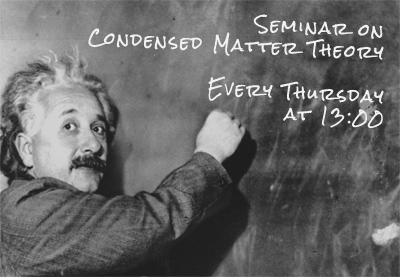Seminar on Condensed Matter Theory
Group of Theoretical Physics at the Department of Condensed Matter Physics
of Charles University has a pleasure to invite you to attend the seminar
on 23rd April 2024 at 15:00
at Faculty of Mathematics and Physics of Charles University, Ke Karlovu 5, 121 16 Praha 2
Seminar room F 052
Dr. Emma Minarelli
Chalmers University of Technology
Quantum transport in interacting systems (I): : improved conductance formulae and effective models
Dr. Emma Minarelli » Quantum transport in interacting systems (I): : improved conductance formulae and effective models
Chalmers University of Technology
This is the first of two lectures on the topic of quantum transport in interacting systems by Dr. Emma Minarelli. The first lecture will be focused on the theoretical foundations and the second on applications. The first lecture will take place on Tuesday 23. 4. at Na Slovance , the second then on Thursday 25. 4. at Ke Karlovu 5.
Location: FzÚ, AV ČR, Na Slovance 2, Praha 8 Solid lecture hall (ground floor, right of the entrance to the SOLID building, room no. 23/1)
The fabrication of electronic devices on nanometer scale has reached unprecedent control, allowing both for a vast range of industrial applications and access to exotic quantum effects. Among the observables potentially extracted from these devices, electrical conductance holds a primary role due to its direct link between experiments and theoretical models.
In this talk we focus on the Kondo effect, whose experimental verification [1] in semiconductor quantum dot devices is an enhancement of conductance below a characteristic energy scale, the so-called Kondo temperature.
Motivated by these experimental and theoretical advances, precise predictions of mesoscopic quantum transport properties are then desired not only to design optimal functionality and control in nanoeletronic devices, but also to investigate further many-body quantum effects.
In the first part of the talk, we go beyond the standard transport paradigms suffering from limitation in system specifics, set-up and parameter range by introducing improved formulae for interacting multi-orbital nanostructures [2]. We address improvements to scattering theory, linear response, non-equilibrium theory via Keldysh and Fermi liquid regime. Then, we introduce generalized effective models for multi-orbital two-lead interacting systems in both Coulomb blockade and mixed-valence regimes using Brillouin-Wigner perturbation theory. This yields conductance predictions based on effective parameters. These results allow flexibility in set-up design and application regime.
We conclude with a demonstration our of approaches [3] in a semiconductor triple quantum dot system where we benchmark our expressions using numerical renormalization group technique (NRG), showing higher numerical accuracy and computational efficiency in regimes and configurations where standard implementations fail.
[1] D. Goldhaber-Gordon et al. Kondo effect in a single-electron transistor. Nature 1998.
S Sasaki et al. Kondo effect in an integer-spin quantum dot. Nature 2000.
[2] E. Minarelli PhD thesis 2022, Quantum transport in interacting nanodevices: from quantum dots to single-molecule transistors,
[3] E. Minarelli et al., Linear response quantum transport through interacting multi-orbital nanostructure, arXiv:2209.01208


